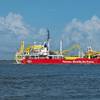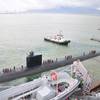Navibulgar, the Bulgarian state-owned shipping company, has completed access modifications to one of its ships and added the Turkish port of Derince in the Sea of Marmara to the schedule for its long-established trans-Black Sea
Ro-Ro ferry operation.
The destination had been 'out of reach' to Navibulgar, whose two 13,000 DWT rail, truck and car ferries - Geroite na Odessa (Hero of Odessa) and Geroite na Sevastopol - were originally constructed with a single stern door designed to be accessed by shore ramp, which Derince and many other ports in the region do not possess.
The addition of a portside rear quarter-ramp to the lower deck for trucks and cars now enables a weekly service linking Derince with Varna (Bulgaria) and Ilichevsk (Ukraine), and also allows Navibulgar to evaluate an expanded
range of additional port options.
Geroite na Odessa's conversion was carried out in Varna in mid-August, and provides a fine example of cooperation between three Bulgarian engineering
companies. The new ramp, which affords permissible axle loads between 10 and
25 tons depending on the distance between axles, was designed and constructed by the Varna-based company, Kaspromat, and installed aboard the
ship by KRZ Odessos, while MTG Delphin 1 added the electrical and hydraulic
components.
Navibulgar's Director Liner Shipping, Captain Marin Marinov says, "The design, construction and installation of this valuable extra facility was
achieved on-time and on-budget. Our local engineering partners here in Varna have delivered an excellent, economic solution which has opened up new possibilities for trading these reliable ships."
The actual commercial and operational benefits of the conversion are now
being assessed, to determine whether similar work should be carried out to
Navibulgar's second ferry, Geroite na Sevastopol.
Geroite na Odessa and Geroite na Sevastopol were built in Norway in 1978,
and each carry up to 108 rail wagons, or 900 cars or a maximum of 19 16m
trucks. The normal combination cargo mix also generates healthy numbers of
driver/passenger-accompanied vehicles, boosting occupancy of the ships' 60+
passenger berths. The crossings are maintained in association with two
Ukrainian flag ferries of almost identical specification, built in the
former Yugoslavia.
Comprising the sea transport element of Corridor VIII of the TransEuropean
Network's series of 10 transport corridors between Western Europe, the
former Soviet Union and beyond, Navibulgar and its forwarding arm Ferrysped
provide door-to-door road, rail and sea transportation of all types of cargo
(without reloading) between Ukraine, Belarus, Kazakhstan, Uzbekistan,
Georgia, Armenia, Azerbaijan, Iran, Afghanistan, Turkey, Greece, Macedonia
and Yugoslavia.
The Varna ferry terminal is the only Black Sea port rail facility equipped
to change the bogies of wagons between the standard European 1435mm and
Russian 1520mm gauges.
With a sales income of BGN 574m (US$267m), Navibulgar is the fourth largest
company in Bulgaria. Since the Black Sea ferry link was established it has
transported a total of 1,572,594 wagons and the service currently moves
120,000 wagons and 3,200,000 tons of cargo in both directions across the
Black Sea every year.
In a further advance, Geroite na Odessa is trialing Navibulgar's use of
electronic charts which if successful, will be installed throughout the
fleet.
Featured videos

Inside the Electrified Truckable Tug

Inmarsat Enhances Service to Drive Digitalization

Tracking Foreign Vessels Working in the U.S. Jones Act Market
Subscribe for
Maritime Reporter E-News
Maritime Reporter E-News is the maritime industry's largest circulation and most authoritative ENews Service, delivered to your Email five times per week









